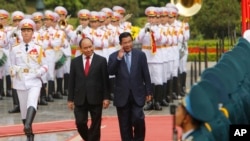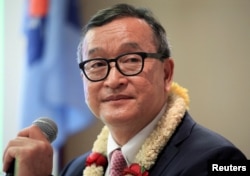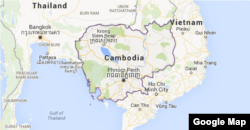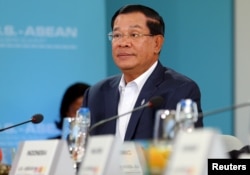Cambodia's long-standing fear of Vietnam can sometimes appear to be borderline irrational and allegations of land grabbing, war-mongering, even contaminated food exports — alongside abusive insults — are often leveled at the eastern neighbors. That will only intensify as the commune elections get closer this year.
Much of the blame for whipping-up the near-hysteria over Vietnam has been directed at recently retired opposition leader Sam Rainsy and his successor Kem Sokha, who have stood to benefit politically by playing on the long-standing enmity.
It paid dividends in 2013, when the Cambodian National Rescue Party (CNRP) performed well at general elections, sharply reducing the number of seats held by the long-ruling Cambodian Peoples Party (CPP) in the National Assembly. Neither party responded to VOA’s request for comment for this story.
“The strategy that politicians use to gain popularity, by condemning Vietnam over invasions here and using insulting words is just not right,” said Muoy Piseth, a spokesman for the Federation of Cambodian Intellectuals and Students.
He added that as a result, ridiculous levels of hate are being passed from one generation to the next.
Fear and loathing
Real or not, those fears are a factor in Chbar Ampov, a district in Phnom Penh with the highest concentration of ethnic Vietnamese in the capital.
Here it is difficult to distinguish between Khmers and Vietnamese because most people speak Khmer fluently, dress Khmer and have adopted Khmer culture.
Despite their assimilation, Chea Ny, a middle aged street drink seller, said she generally dislikes Vietnam and claims most who live here are illegal immigrants who sneak across the border on boats and venture up the Mekong River to Phnom Penh looking for work.
“I hate them. I hate them for messing around in our land. They steal our jobs and the government is doing nothing about it,” she said, at times using a derogatory Khmer word used to describe Vietnamese.
Fear mongering often centers around the Vietnamese invasion of Cambodia in late 1978 and Hanoi's decade-long occupation.
For some that was the culmination of ambitions espoused by Vietnamese communist leader Ho Chi Minh, who wanted to rule over all the former French colonies as an Indochina federation, inclusive of Cambodia, Laos, North and South Vietnam.
But for others it was Hanoi that ended Pol Pot's reign of terror and later installed Hun Sen as prime minister, leaving him open to opposition accusations of running a Vietnamese puppet government.
Social media has also had an impact, with home made videos purportedly showing toxic levels of chemicals and pesticides being used on Vietnamese grown vegetables destined for the Cambodian market, alongside erroneous claims that the neighbors are trying to kill Khmers.
“People know about this through Facebook. There are clips showing how they inject chemicals into chickens, vegetables and lobsters,” Muoy Piseth said in a reference to fake news.
“Our people worry about food, they think there are new methods being used to harm Cambodians through chemically laced foods that are imported without proper checks by the authorities.”
In response, food importers have undertaken their own marketing strategies, including extensive advertising in national newspapers, to allay consumer fears over food safety.
Pending polls
It's rich fodder for the CNRP to exploit at commune elections, to be held on June 4. It will also serve as a precursor for the national poll to be held in July next year, with Hun Sen expected to be busy tamping down allegations of Vietnamese interference.
During the 2013 election, CNRP supporters targeted ethnic Vietnamese voters. Calling themselves “election observers for free and fair elections” they were caught attempting to block Vietnamese from casting their ballots.
The border, where Sam Rainsy has accused Hanoi of encroaching into Cambodian territory, is a flashpoint. Land grabbing by Vietnamese companies is a genuine issue that has been highlighted by NGOs like Global Witness.
Analysts said anti-Vietnamese sentiment also plays well with the youth vote, who are expected to figure prominently at the polls. Two decades of peace has spawned a baby boom, with 70 percent of the population under the age of 30 and they backed the CNRP four years ago.
But Muoy Piseth is urging a more sensible approach, noting Cambodia has obligations as a member of the Association of South East Asian Nations (ASEAN) and can ill-afford such discrimination which would make it impossible for Kem Sokha to deal with Hanoi if his party wins at next year's election.
His sentiments were echoed by Mory Sar, Vice President of the Cambodian Youth Network who warned racism was unacceptable in a democracy and a violation of human rights.
“If the political message is to encourage Cambodian citizens and youth to be too nationalistic, then it will have a negative impact. What we are concerned with is that if youth becomes racist then this can then lead to violence between the two nations,” he said.
He said the CNRP had capitalized on anti-Vietnamese sentiment with its agenda but it had not gained the full support of the public and has been sharply criticized by the international community for its political message, which is pushing racism.
“For me, what the opposition should do is to change their strategy from an extended racist policy to a constructive plan that helps to solve national issues,” he said.
He said it was difficult to say how the two main political parties will fare at the June polls and national elections next year because there is a lack of clear, comprehensive research into voting intentions nor are there any opinion polls.
“We will wait and see their election campaigns, to see whose got the best policies that can solve national problems. Cambodia is a much more mature political society these days and people will think clearly before deciding who to vote for,” he said.
Luke Hunt contributed to this report.







